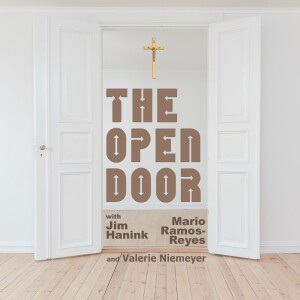
Episode 261: Monica Migliorino Miller on the Personhood of the Pre-Born Human Being (June 14, 2023)
 2023-06-17
2023-06-17
Download
Right click and do "save link as"
This week on The Open Door (June 14 th ), panelists Jim Hanink, Mario Ramos-Reyes, and Valerie Niemeyer discuss the ongoing pro-life struggle. There’s much to consider. We’ll explore the role of nonviolent direct action. In addition, we’ll tackle the question of the personhood of the pre-born human being. Of late, Pope Francis has commented on this question. Our special guest is Monica Migliorino Miller. She has recently been released from jail; her “crime” was taking part in a Red Rose Rescue. Miller holds graduate degrees in Theology from Loyola University and Marquette University and teaches theology at SacredHeart Major Seminary in Detroit. She is the author of The Theology of the Passion of the Christ (Alba House), The Authority of Women in the Catholic Church (Emmaus Road), and Abandoned: The Untold Story of the Abortion Wars (St. Benedict Press). Miller’s article “It’s Time the Church Declared the Personhood of the Unborn” appears in the May issue of the New Oxford Review.
1. Could you tell us about the Red Rose Rescue that landed you in jail?
2. Does today’s widespread acceptance of abortion express what Hannah Arendt famously called “the banality of evil”?
3. What is your message for people who are thinking about joining a rescue action?
4. Pope Francis affirms that the unborn baby is a human being but seems hesitant about
acknowledging that he or she is a person. Why?
5. Just what is ensoulment?
6. Could you comment on Boethius’s definition of a person as an individual substance of a rational kind?
7. You note Vatican II’s teaching that abortion, among other grave wrongs, “violates the
integrity of the human person.” Has this language been forgotten?
8. St. John Paul II, in his encyclical Evangelium Vitae, teaches that “to kill a human being,”
as abortion does, “in whom the image of God is present, is a particularly serious sin.” He
teaches as well that “Disregard for the right to life, precisely because it leads to the
killing of the person whom society exists to serve, is what most directly conflicts with the possibility of achieving the common good.” Is this teaching sufficiently authoritative to establish the personhood of the unborn?
9. Isn’t every human being a person?
10. What steps might we take to urge that the Church dogmatically recognize the personhood of the unborn human being?
view more
1. Could you tell us about the Red Rose Rescue that landed you in jail?
2. Does today’s widespread acceptance of abortion express what Hannah Arendt famously called “the banality of evil”?
3. What is your message for people who are thinking about joining a rescue action?
4. Pope Francis affirms that the unborn baby is a human being but seems hesitant about
acknowledging that he or she is a person. Why?
5. Just what is ensoulment?
6. Could you comment on Boethius’s definition of a person as an individual substance of a rational kind?
7. You note Vatican II’s teaching that abortion, among other grave wrongs, “violates the
integrity of the human person.” Has this language been forgotten?
8. St. John Paul II, in his encyclical Evangelium Vitae, teaches that “to kill a human being,”
as abortion does, “in whom the image of God is present, is a particularly serious sin.” He
teaches as well that “Disregard for the right to life, precisely because it leads to the
killing of the person whom society exists to serve, is what most directly conflicts with the possibility of achieving the common good.” Is this teaching sufficiently authoritative to establish the personhood of the unborn?
9. Isn’t every human being a person?
10. What steps might we take to urge that the Church dogmatically recognize the personhood of the unborn human being?
More Episodes
WCAT Radio The Open Door (June 12, 2020)
 2020-06-11
2020-06-11
 2020-06-11
2020-06-11
WCAT Radio The Open Door (June 5, 2020)
 2020-06-06
2020-06-06
 2020-06-06
2020-06-06
WCAT Radio The Open Door (May 29, 2020)
 2020-05-27
2020-05-27
 2020-05-27
2020-05-27
WCAT Radio The Open Door (May 22, 2020)
 2020-05-21
2020-05-21
 2020-05-21
2020-05-21
WCAT Radio The Open Door (May 15, 2020)
 2020-05-14
2020-05-14
 2020-05-14
2020-05-14
WCAT Radio The Open Door (May 8, 2020)
 2020-05-06
2020-05-06
 2020-05-06
2020-05-06
WCAT Radio The Open Door (May 1, 2020)
 2020-05-02
2020-05-02
 2020-05-02
2020-05-02
WCAT Radio The Open Door (April 24, 2020)
 2020-04-23
2020-04-23
 2020-04-23
2020-04-23
WCAT Radio The Open Door (April 17, 2020)
 2020-04-16
2020-04-16
 2020-04-16
2020-04-16
WCAT Radio The Open Door (April 10, 2020)
 2020-04-09
2020-04-09
 2020-04-09
2020-04-09
WCAT Radio The Open Door (April 3, 2020)
 2020-04-01
2020-04-01
 2020-04-01
2020-04-01
WCAT Radio The Open Door (March 27, 2020)
 2020-03-26
2020-03-26
 2020-03-26
2020-03-26
WCAT Radio The Open Door (March 20, 2020)
 2020-03-18
2020-03-18
 2020-03-18
2020-03-18
WCAT Radio The Open Door (March 13, 2020)
 2020-03-11
2020-03-11
 2020-03-11
2020-03-11
WCAT Radio The Open Door (March 6, 2020)
 2020-03-06
2020-03-06
 2020-03-06
2020-03-06
WCAT Radio The Open Door (February 28, 2020)
 2020-03-02
2020-03-02
 2020-03-02
2020-03-02
WCAT Radio The Open Door (February 14, 2020)
 2020-02-15
2020-02-15
 2020-02-15
2020-02-15
WCAT Radio The Open Door (February 7, 2020)
 2020-02-07
2020-02-07
 2020-02-07
2020-02-07
WCAT Radio The Open Door (January 31, 2020)
 2020-02-02
2020-02-02
 2020-02-02
2020-02-02
WCAT Radio The Open Door (January 24, 2020)
 2020-01-24
2020-01-24
 2020-01-24
2020-01-24
012345678910111213141516171819
Create your
podcast in
minutes
- Full-featured podcast site
- Unlimited storage and bandwidth
- Comprehensive podcast stats
- Distribute to Apple Podcasts, Spotify, and more
- Make money with your podcast
It is Free
- Privacy Policy
- Cookie Policy
- Terms of Use
- Consent Preferences
- Copyright © 2015-2024 Podbean.com




